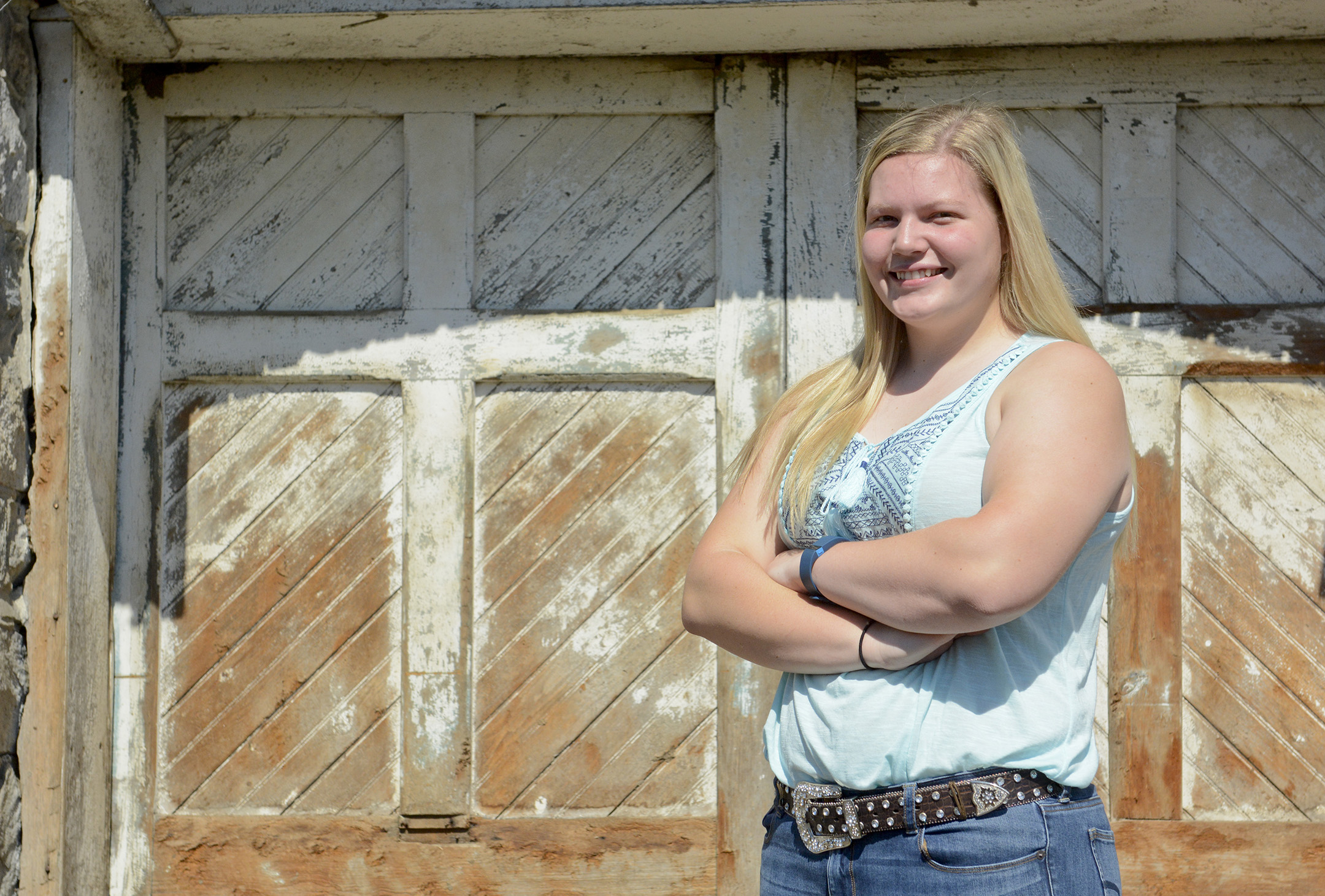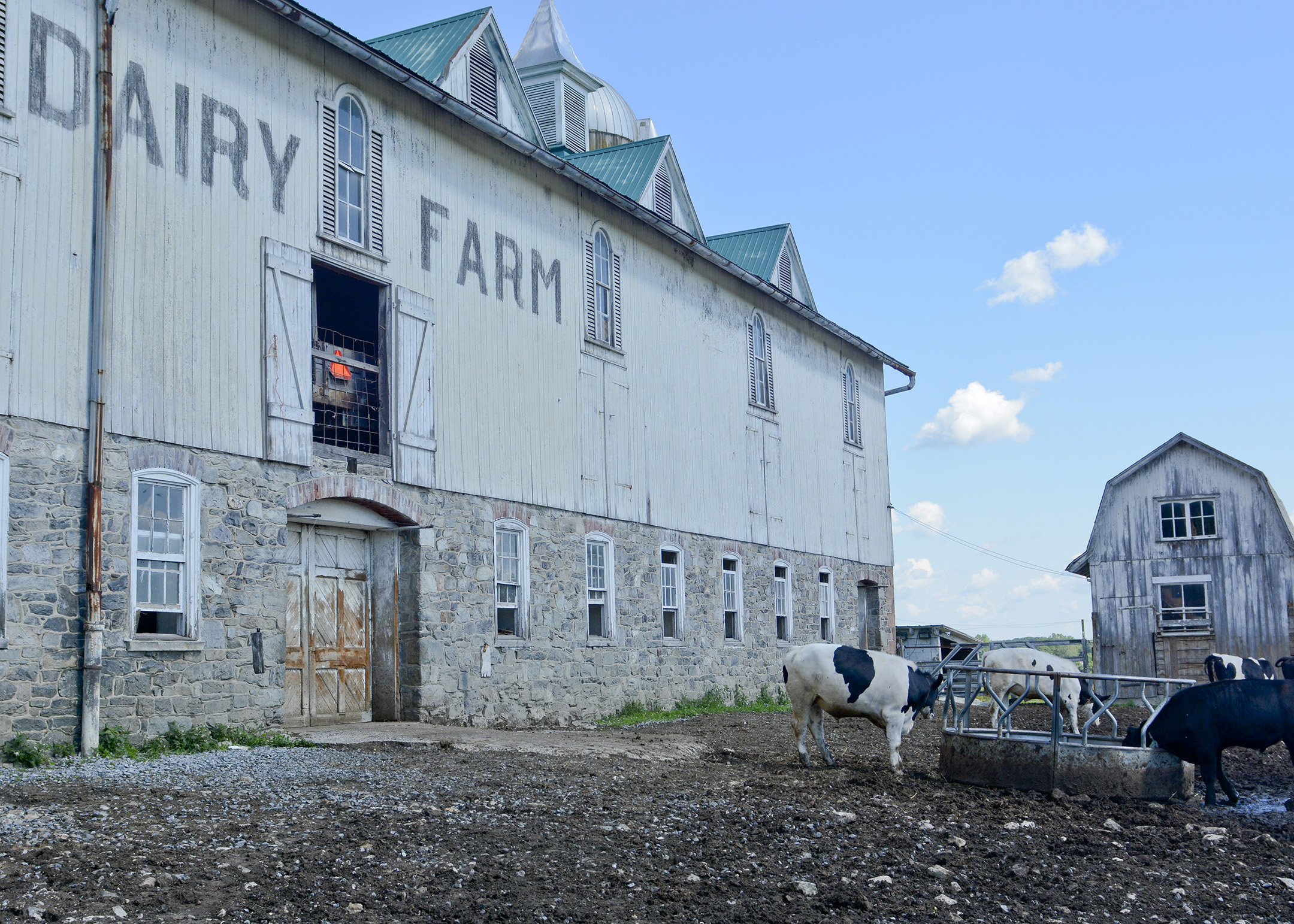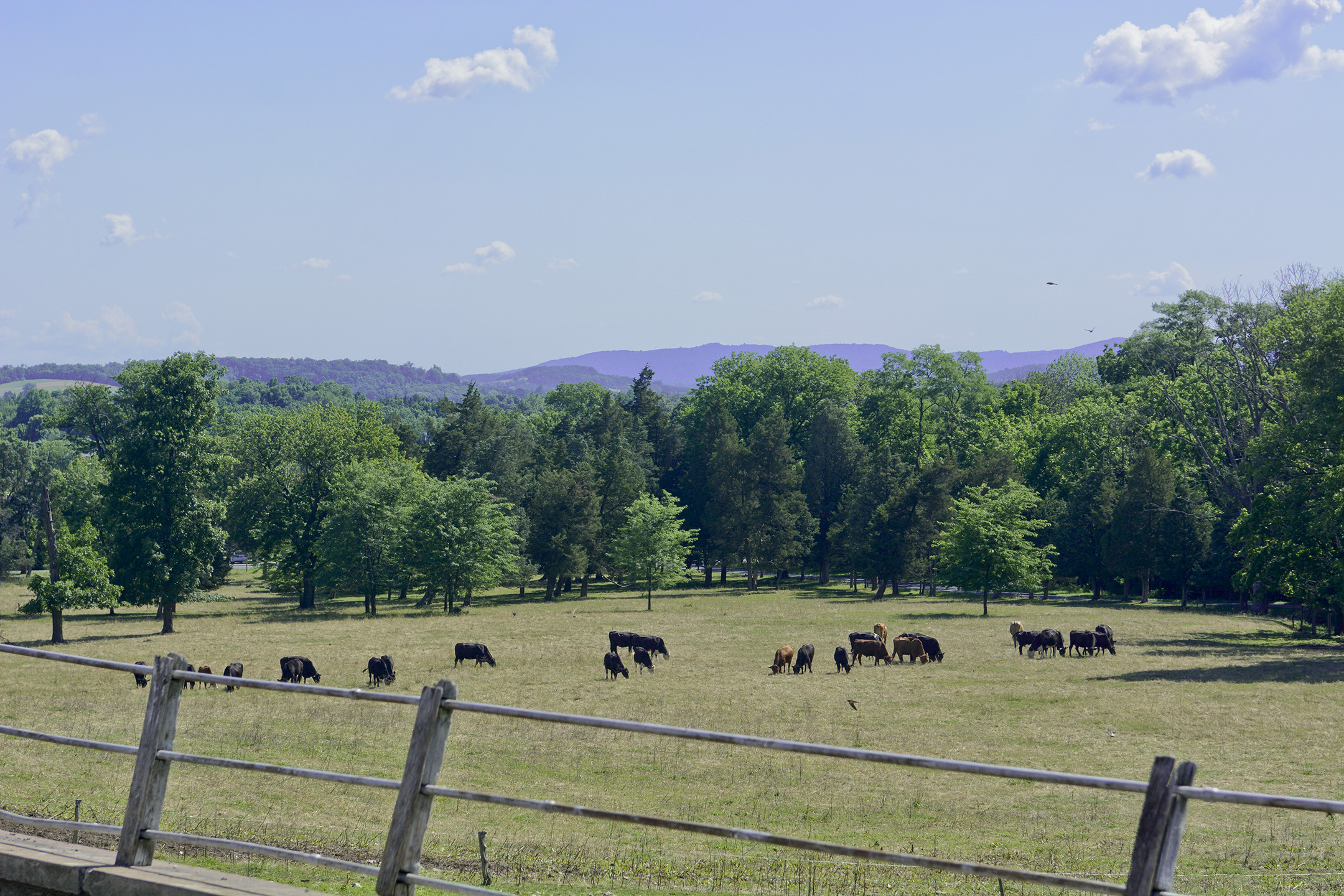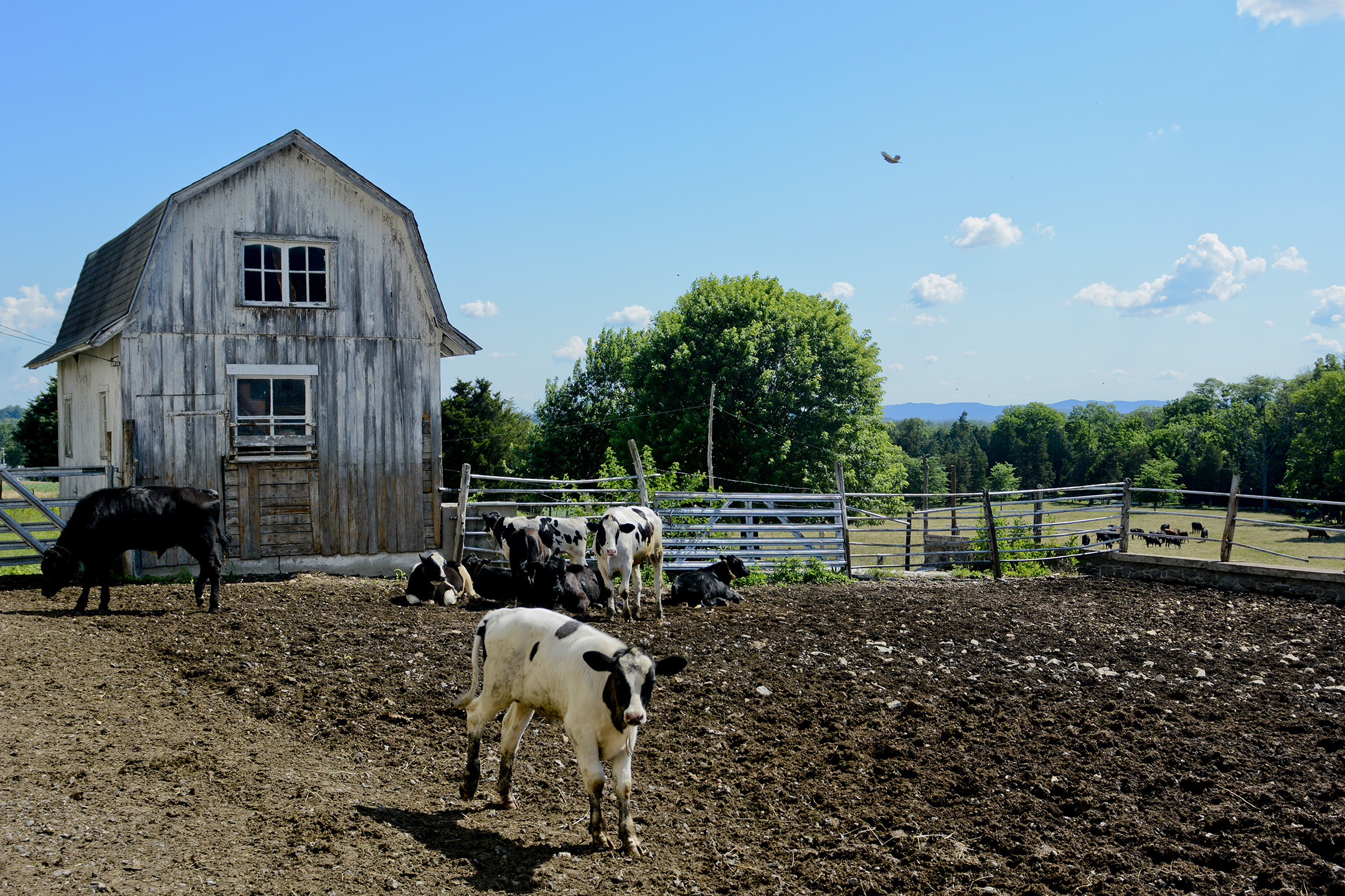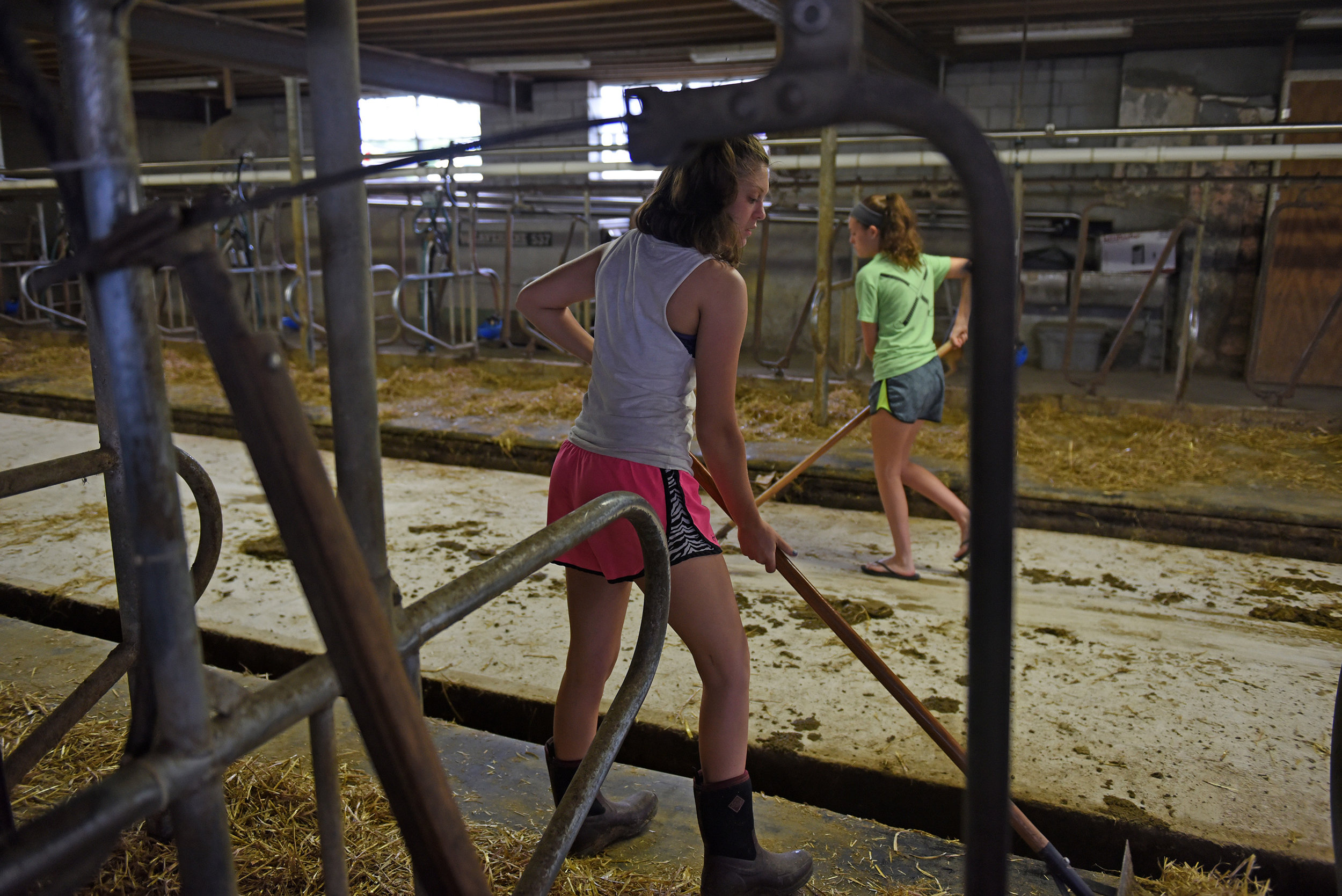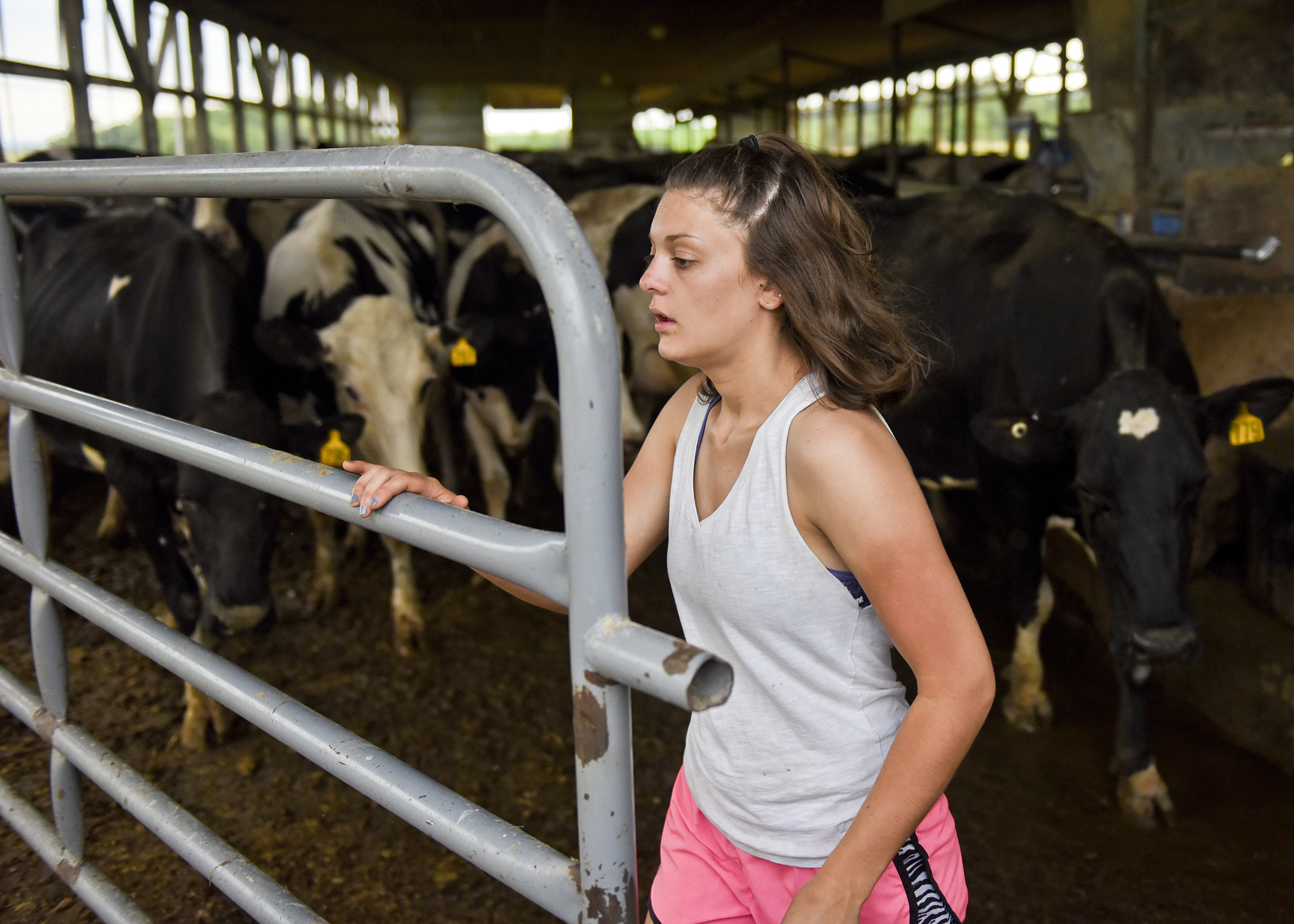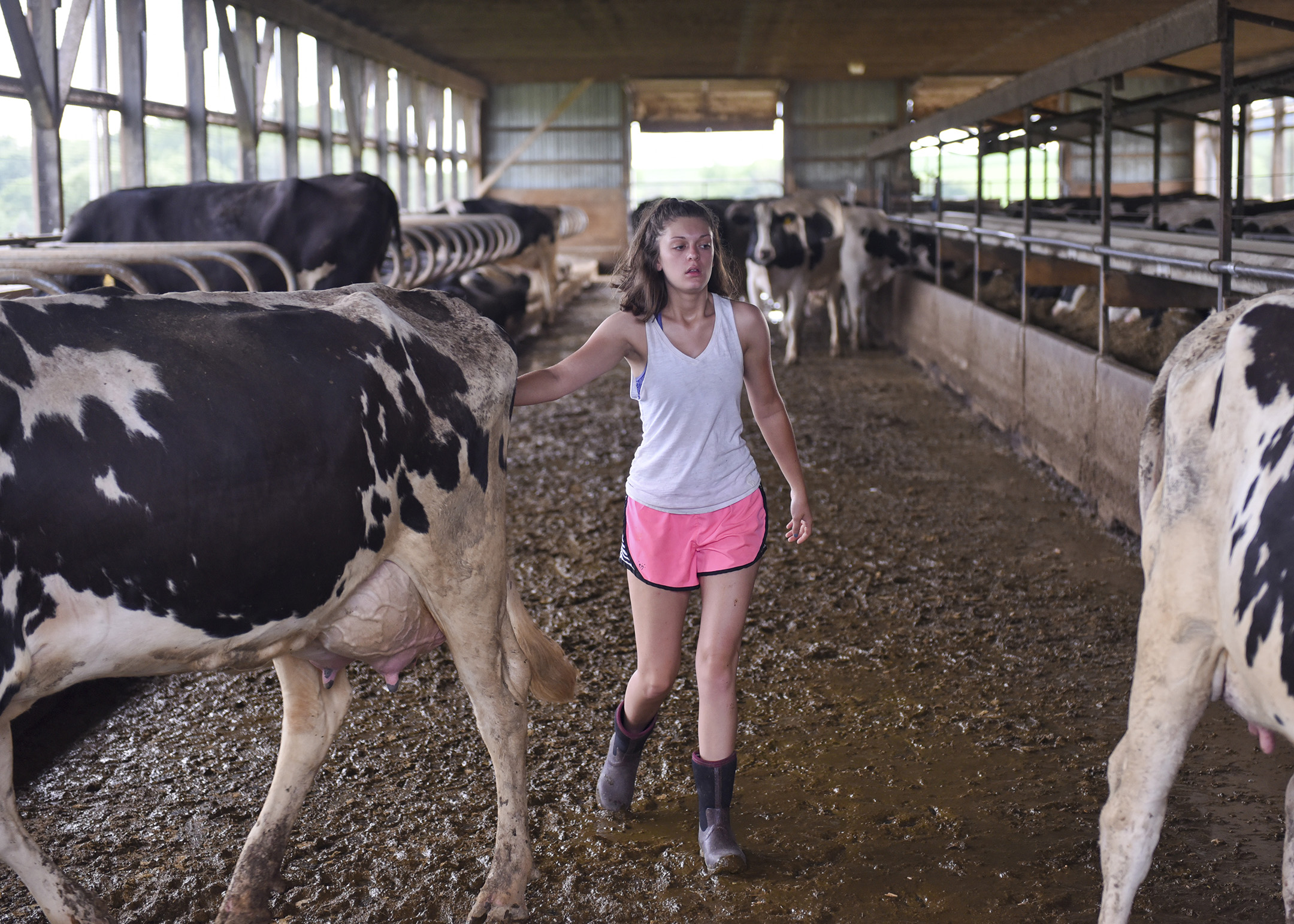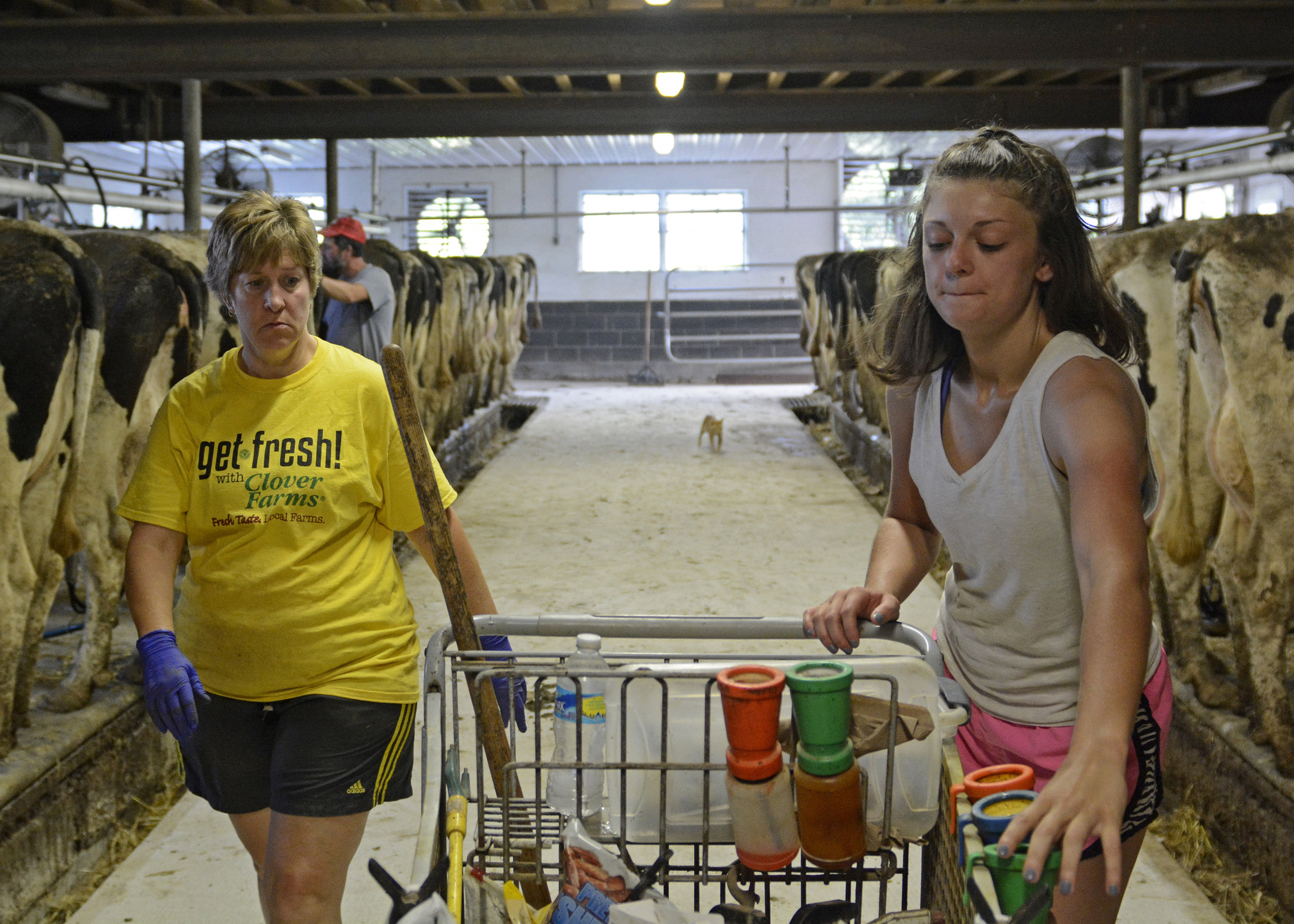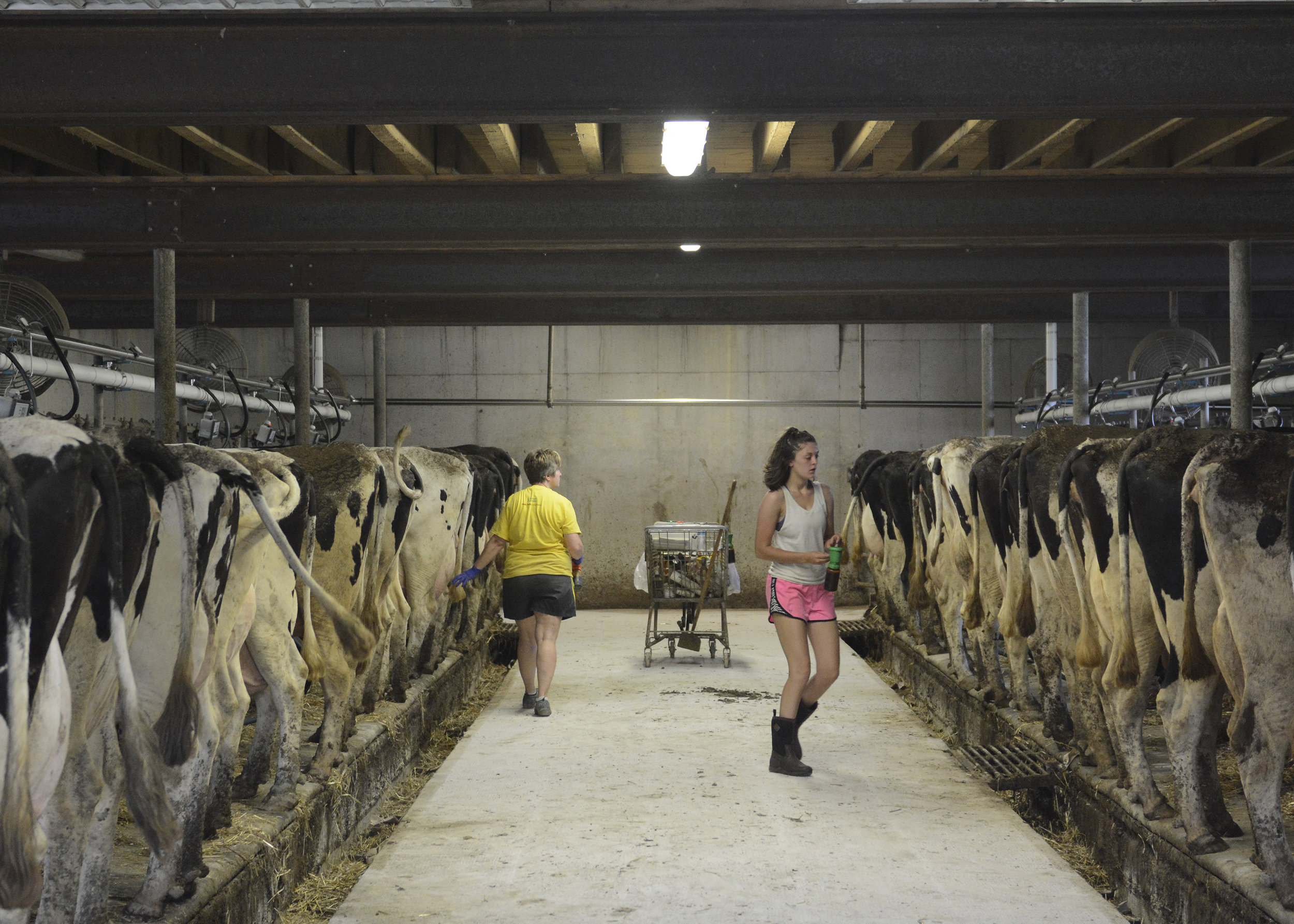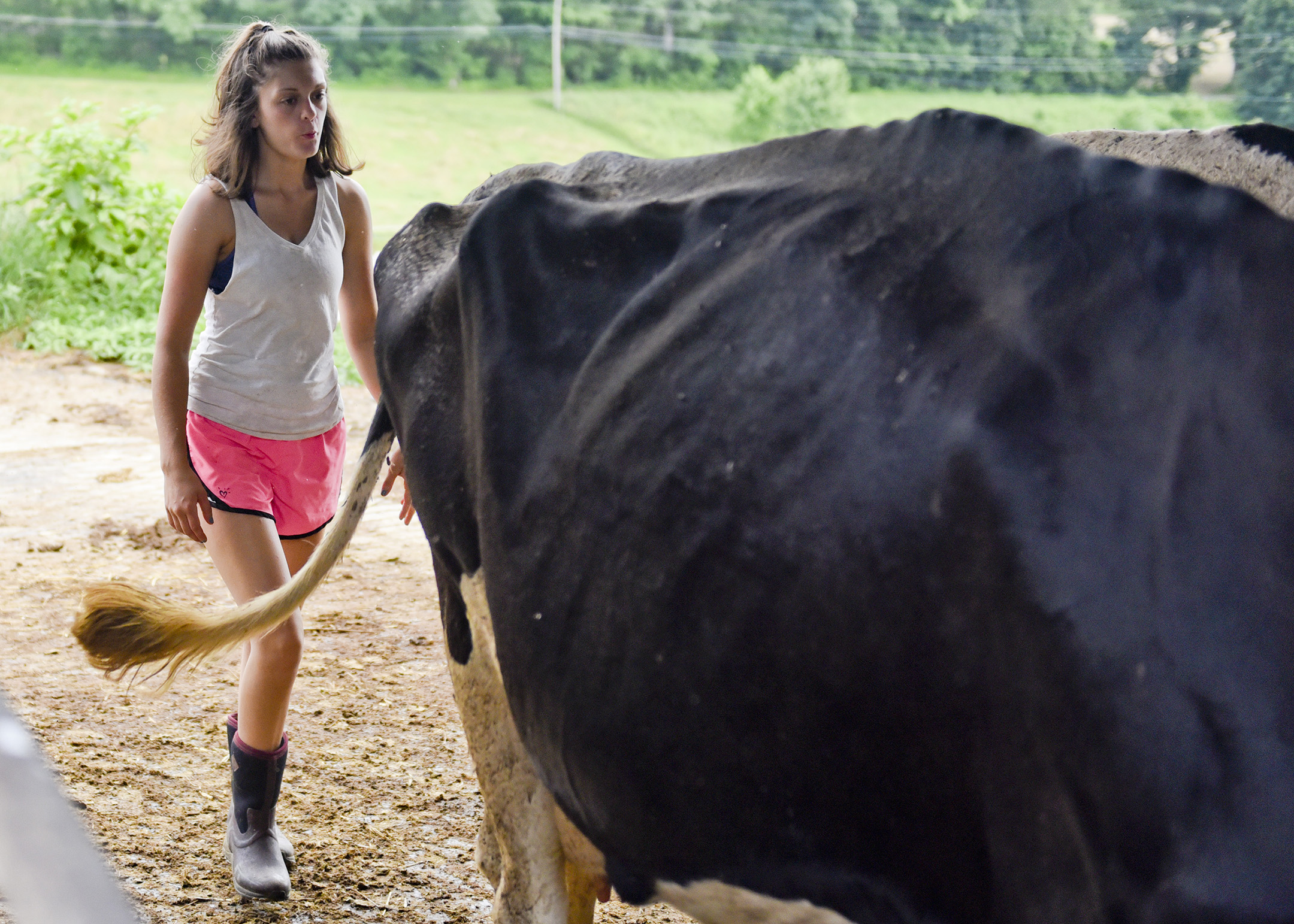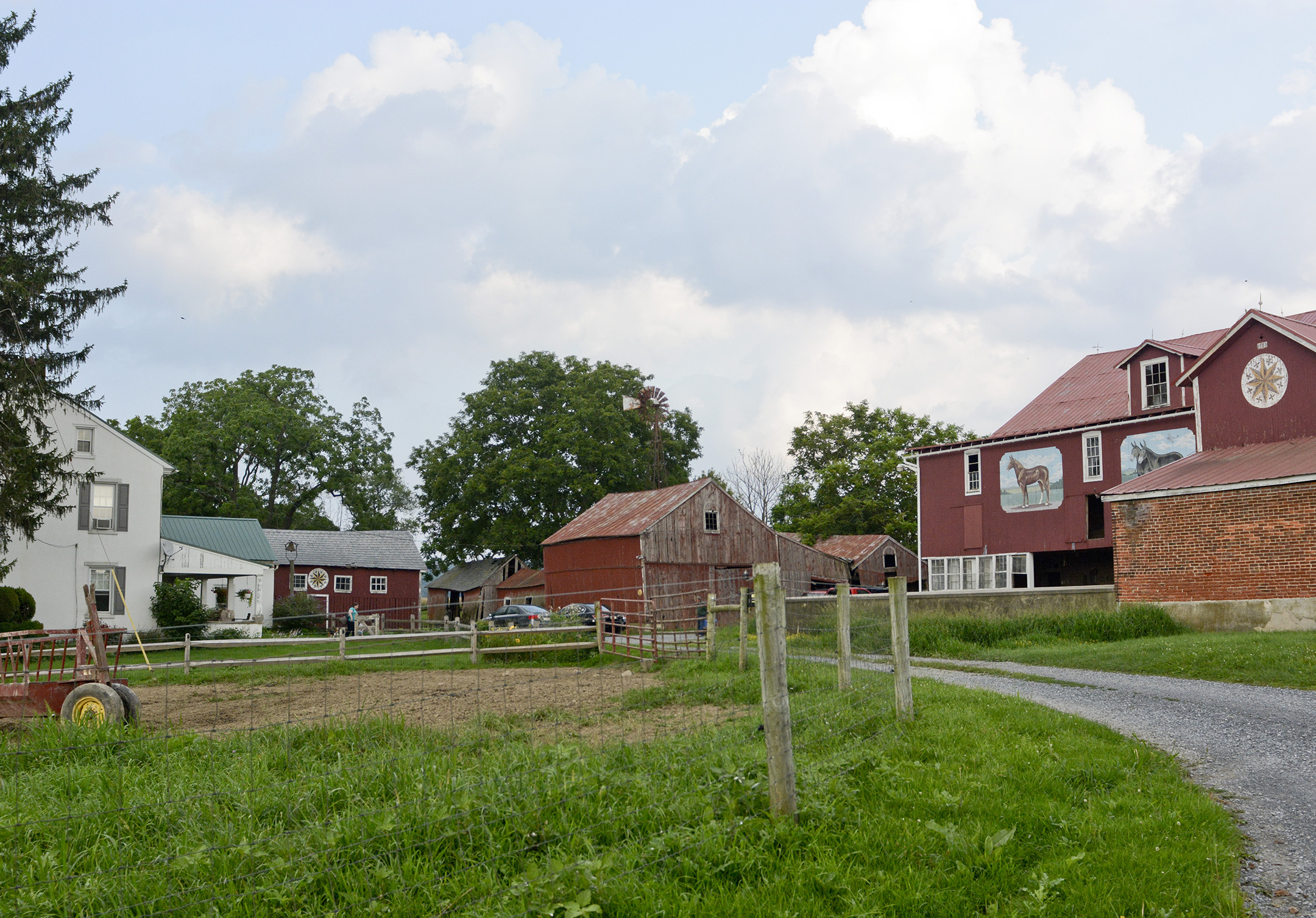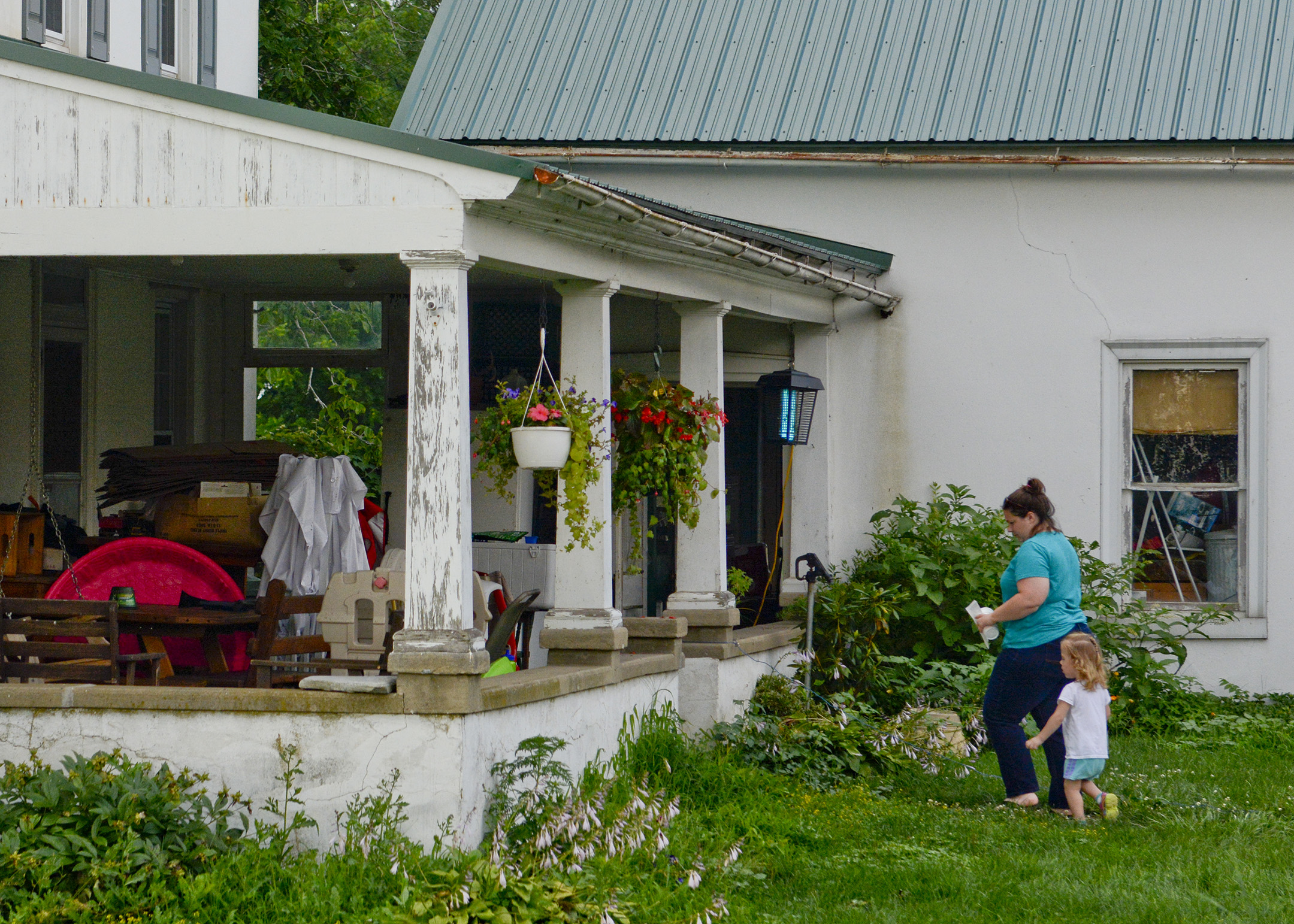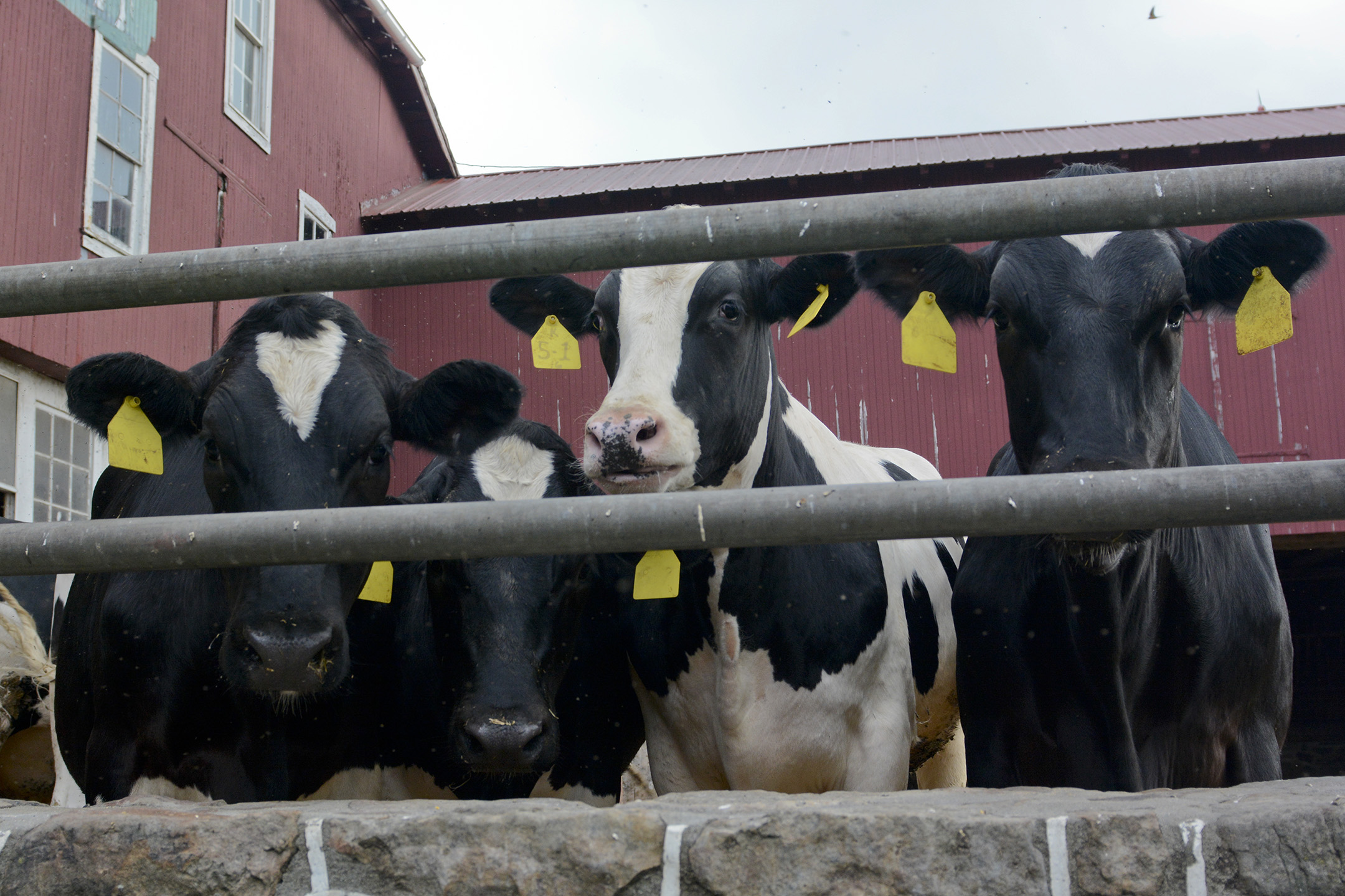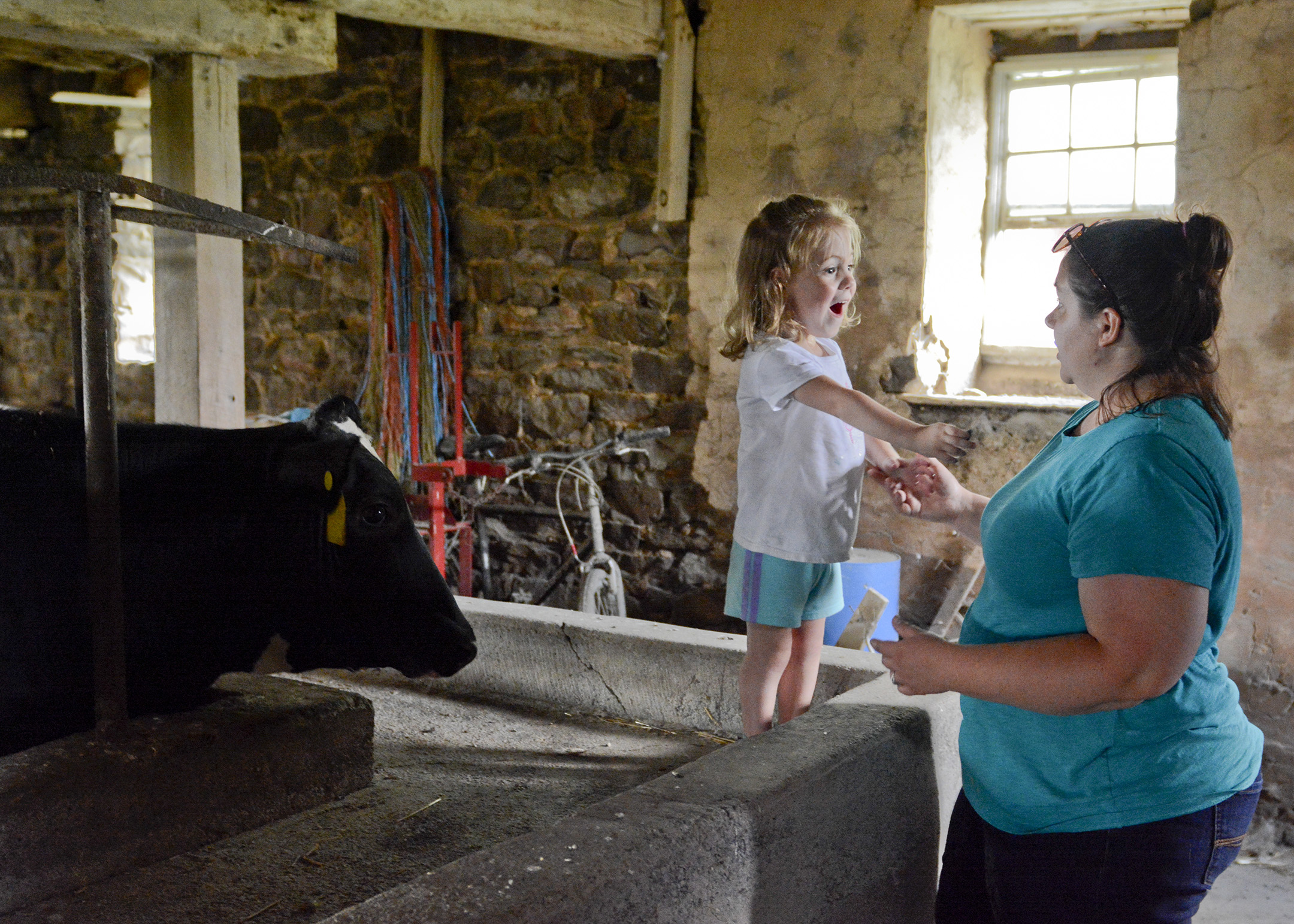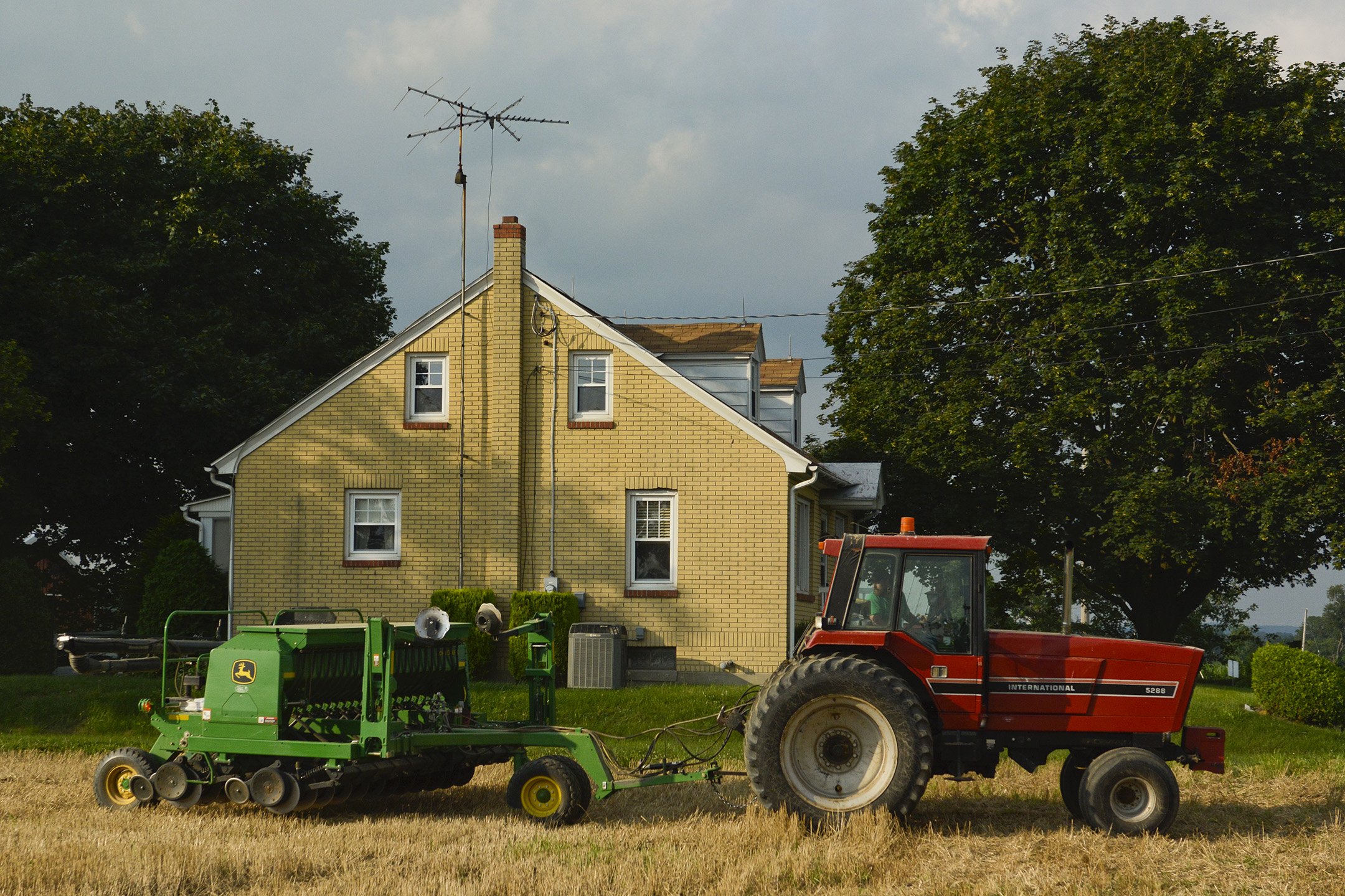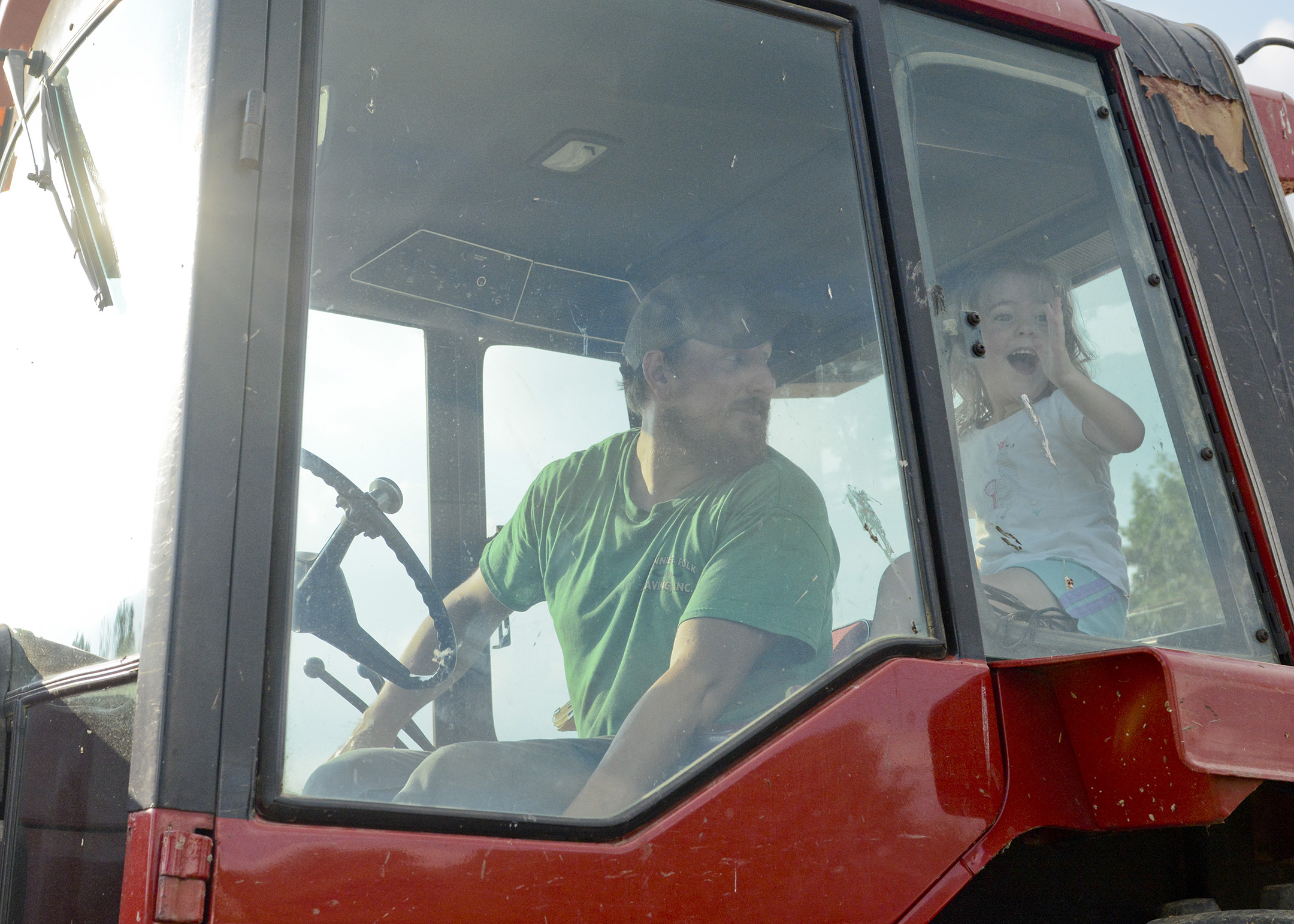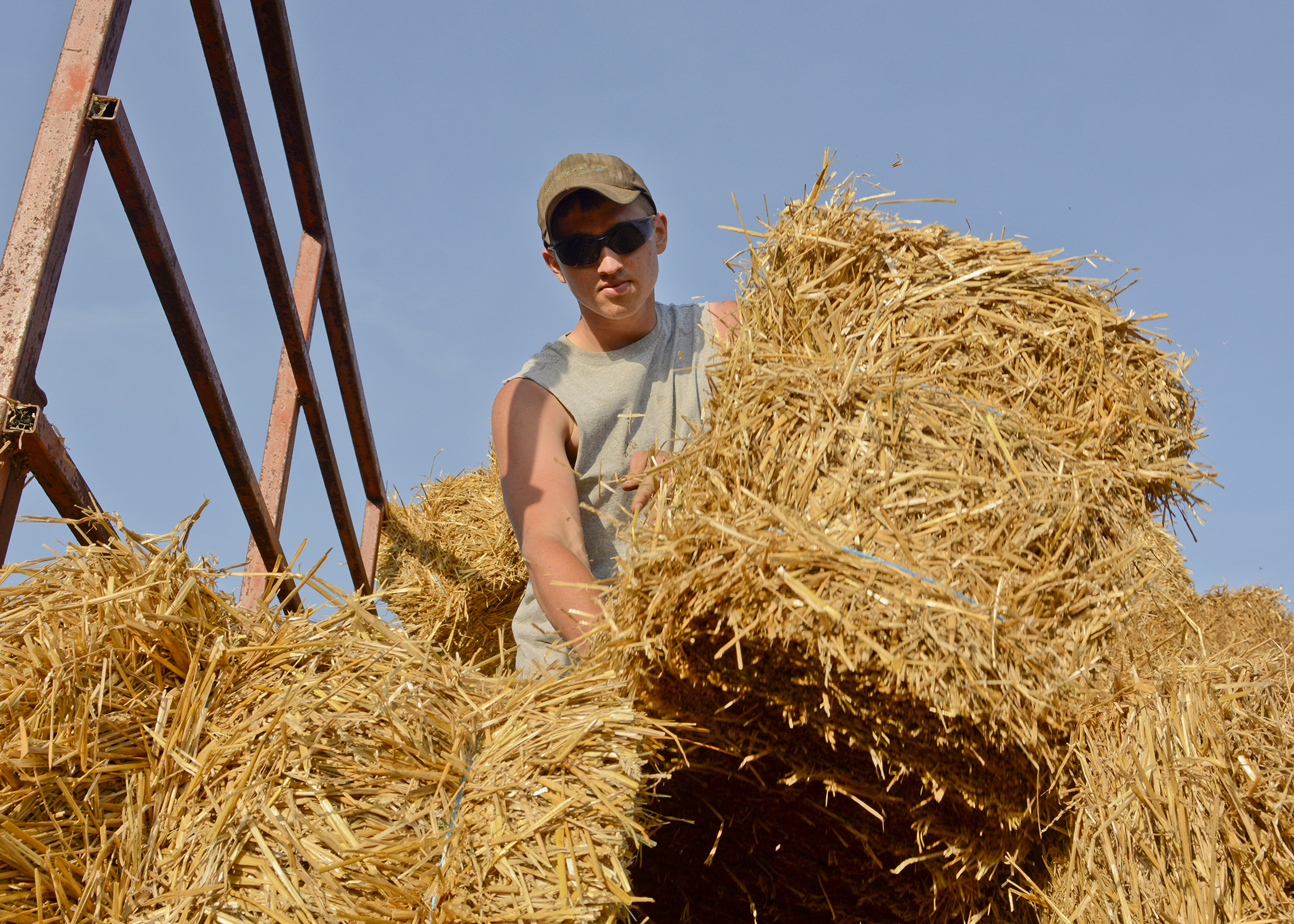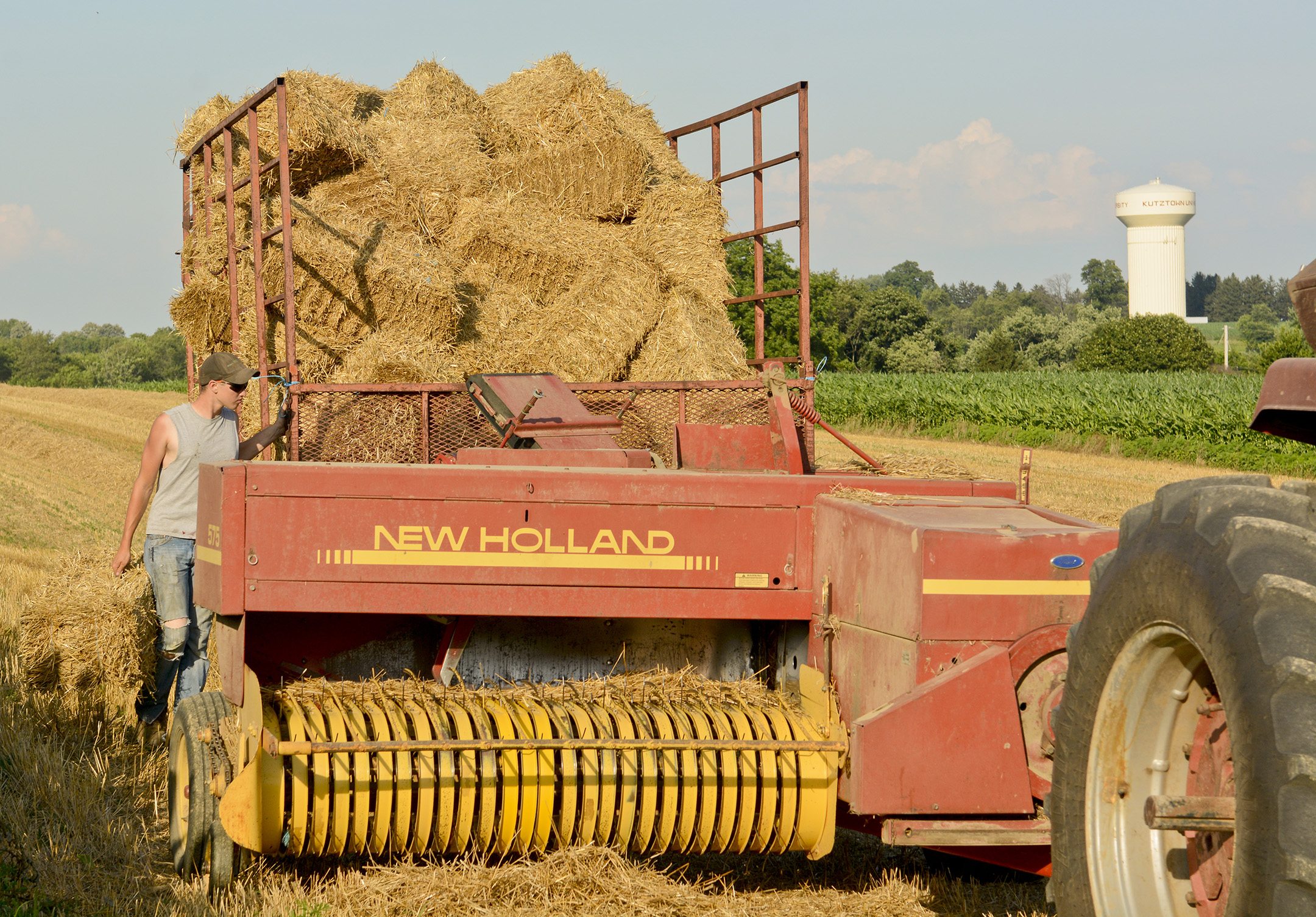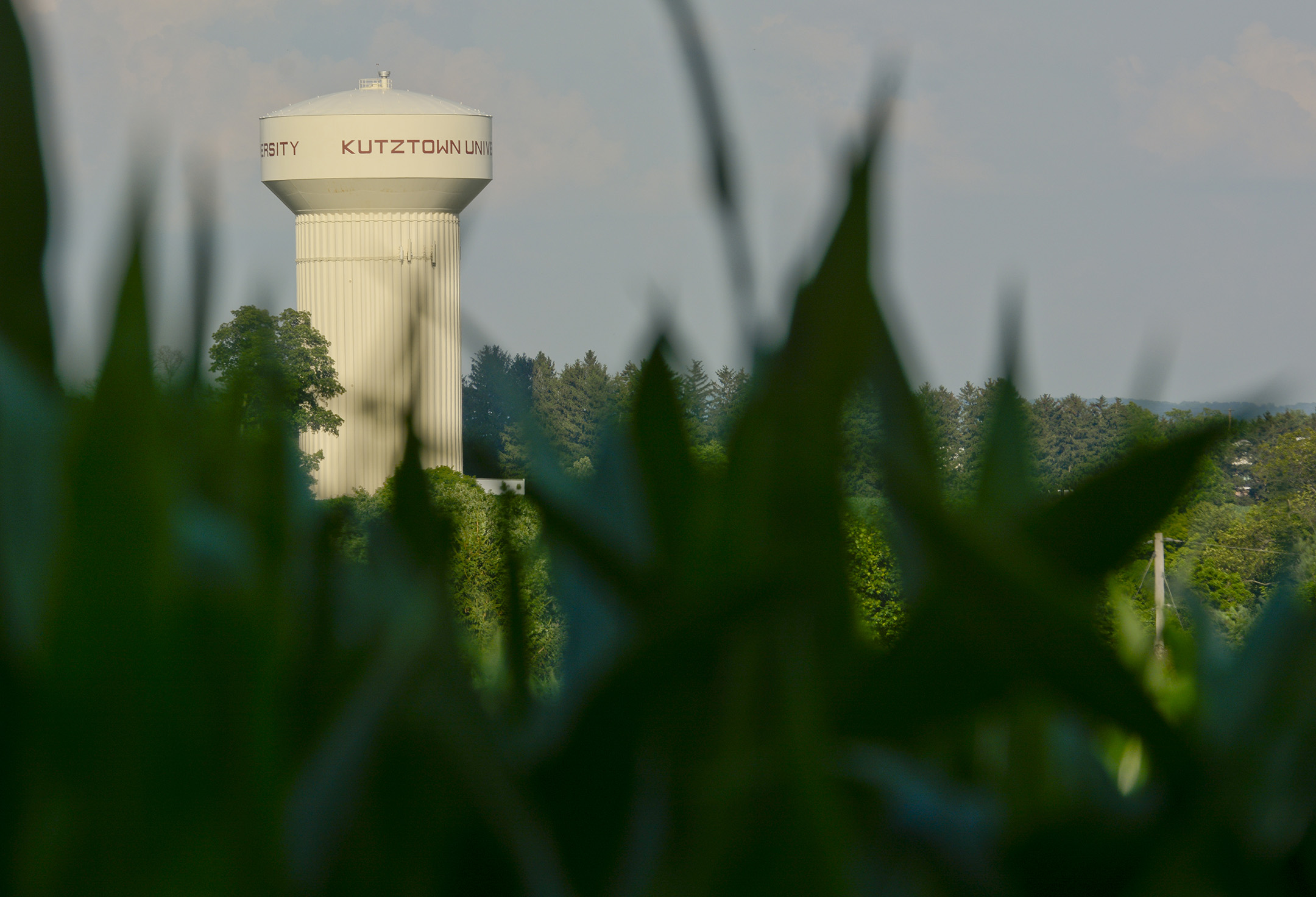Will they stay?
Reporting by Ellen Bardash and Jenny Roberts, Photos by Carl Fonticella (Intern Project, Reading Eagle)
Samuel Angstadt, 19, went to work on his parents’ farm in Richmond Township after graduating from Fleetwood High School. He never seriously considered anything else, he says.
The future of a family farm depends on children willing to stay. For parents, and their kids, it’s an emotional decision.
Children raised on a farm learn about agriculture at an early age, helping their parents bale hay and feed animals, and taking on more responsibilities as they grow. As they mature, they also begin to realize the economic stressors that plague the farming industry and the financial challenges their families face. They watch as their parents follow stock market prices, and monitor the politicians who create agricultural policy. Children whose families have owned their farms for generations begin to wonder what the future may have in store for them. There is an important decision they will have to make: Take over the family business, keeping the farm around for another generation, or strike out on their own to pursue a new career.
For farm kids, and their parents, that choice is a daunting and emotional one. These are the stories of how four families in Berks County, Pennsylvania worked it out.
The Schaeffers
Adam Schaeffer, Sr. bought the 117-acre Grand View Dairy Farm when it went up for public sale in 1929. The following year, his family moved in. It has been in the family ever since.
“The Great Depression hit, and they were able to keep it, and I know they worked hard,” said Schaeffer’s grandson Brian, 52, of South Heidelberg Township. “I feel fortunate to have a little part of that.”
Brian grew up working on the farm just like his two brothers and sister. He helped milk the cows. In 1996, he took over the farm with his brother David. They don’t milk cows anymore, they raise beef cattle and grow crops such as corn and soybeans on a second farm farther up the mountain. Brian’s wife, Tracy, and their two daughters also help out on the farms. Their oldest, Amanda, 17 (pictured above), just graduated from Conrad Weiser High School this year and will continue on at Penn State Berks in the fall to study large animal science and herd management. She will be the first Schaeffer to go to college.
“Dad is thrilled that she’s picking something in the farming industry, and especially the dairy industry,” Brian said. “I milked cows here for 28 years, and if my body would have allowed it, I’d probably still be milking cows today, so I am absolutely thrilled.”
Amanda plans to work in the nutrition or genetics field, possibly becoming a breeder. But eventually, she wants to come back to the farm, keeping it in the family for another generation.
“I think I want to see what’s out there a little bit first, get a taste, maybe work for some other people, get some ideas, then bring it back here,” she said. “Hopefully, my sister’s out of school by then and then we
can team up together.”
Amanda’s sister, Emma, 15, hopes to be a large-animal veterinarian when she’s older. But Amanda wasn’t always sure she wanted to come back to the farm. She began looking into colleges in the first place because she wanted to be a park ranger. However, she didn’t like that she would have to carry a gun on the job and changed her mind.
“Then I’m like, ‘I know I enjoy doing stuff here, so why don’t I just do something I like?’ ” she said.
When she told her friends about her plans, they were surprised.
“They just give me the crazy eyes and they’re like, ‘Really? Is that a career?’” she said.
Many of the students in her graduating class are pursuing careers in the medical and teaching fields. But Amanda was more attracted to the prospect of spending her time working with cows.
“I just think they’re really cute and they’re really friendly,” she said. “I like being around cows all the time, and I really like working with them, so why not help to improve their life?”
Brian said he worried at times that there might not be anyone to take over the family farm. Between himself and his three siblings, they have six daughters.
“Everybody was telling me all my years that, ‘You need to have boys. You need to have boys,’” he said. “But what they don’t understand is, girls attract boys, and maybe I’ll get a son-in-law instead of a son.”
If his daughters change their minds about working on the farm, Brian said, he has hopes they might at least maintain ownership of it. But he doesn’t want his daughters to feel forced into any decisions.
“Life is too short to be made to do something you don’t enjoy,” he said.
The Kricks
Morgan Krick, 19, never thought she would go to college. The plan was to graduate high school and go right to work on her family’s dairy farm in Windsor Township, Arl-Ja Farm. Her grandparents own the farm, but her father, Lynn, works on it full time. Morgan; her younger sister, Megan; and her mother, Sherrie, all help with milking in the evenings. The Kricks were named Berks Farm Family of the Year by the Reading Fair board for 2017.
“When I was younger, I knew I wanted to stay here on the farm,” Morgan said. “I didn’t want to go to college and that was kind of set in stone even when I was a senior in high school.”
But Morgan warmed up to the idea of college as she saw first-hand farming’s uncertain future. She closely monitored Gov. Tom Wolf’s proposed cuts to the state Department of Agriculture in the 2015-2016 budget, which would have cut funding for agricultural extension offices and 4-H programs, programs Morgan and her sister both participated in. Those cuts were restored by the PA General Assembly, but before the budget was passed. She wrote about the fiscal debate for the Publication Club at her high school.
“We basically provide for the world,” Morgan said of the farming industry. “To put a cut and a hold on stuff like that, I just didn’t understand it.”
This budget scare, coupled with decreased milk prices in recent years, concerned her. She has seen local farms like her family’s shut down because they couldn’t afford to continue. Her parents encouraged her
to consider college. Lynn Krick said he didn’t think the farm would be able to provide a full income for Morgan in addition to already supporting his parents, himself and his wife.
“They kind of pushed me more toward college just because it’s kind of hard to get a decent job without going to college now,” Morgan said.
Morgan will be a sophomore when she returns to Delaware Valley University in the fall to study agribusiness.
She still plans to come back to her family’s farm after graduation, but her degree will provide her with a backup plan if she needs it. Right now, Morgan is exploring other farming interests besides dairy, interning with the company Crop Production Services. She scouts fields to identify weeds and test soil deficiencies for farmers locally. Meanwhile, Megan, 17, will start her senior year of high school in the fall and still is trying to determine whether or not she wants to follow in her sister’s footsteps.
“I would like to go to college; I just don’t know what for,” she said. “But I would also like to stay here because it’s something I’m used to and going off to college would be something totally different for me.”
She’s interested in agricultural business like her sister, or studying to become a dental hygienist, but with a year of high school left, she’s still not certain of her plans. Morgan’s goals are clearer.
“I’d like to go to school, graduate, come back to the farm,” she said. “If that doesn’t happen right away, then it doesn’t happen. But at some point, I want to land back here.”
The Gaukers
All farm children eventually have a decision to make: Should I stay or should I go. Members of the Gauker family decided to do both, and reshaped their ninth-generation family farm in the process.
But it’s not easy.
Lee Gauker, 34, works at least 45 hours a week as a mechanic and welder. His wife, Jodi, 32, is an agriculture consultant for the Chester County Economic Council and the executive diqrector of Lundale Farms, a non-profit farm in Pottstown.
“Fifty percent of your day goes to your day job and 75 percent of your day goes to farming,” Lee said.
The family owns Gauker Farms in Richmond Township, which has been passed down for more than 175 years. Their barn was built in 1841, and the house they live in with their daughter, Callie, was built in 1843.
The couple is taking over the farm from Lee’s parents, Barry and Jackie Gauker, who live on the farm across the street. Although they were happy to see Lee take interest in farming, both Barry and Jackie said they never wanted to pressure their children into the family business.
“We told the kids, go to college; go out there and see what’s out there,” Jackie said. “You need to work for somebody else for a little while. But the farm would always be there for them to come back to.”
Jackie and Barry’s daughter Mandy Marbarger decided not to farm, though she and her husband have stayed involved. For Lee and Jodi, staying on the farm but altering some of their practices was a way to use their education to keep a family tradition alive and still pursue the careers that interested them. Lee knew from a young age that he wanted to continue working on the farm.
“I grew up doing it my whole life, and just really enjoyed it all the time, right from the beginning,” he said.
While much has stayed the same on the farm over the years, Gauker Farms’ business side has changed significantly. In the farm’s infancy, the family (then the Schaeffers) were subsistence farmers, generally producing only what their household needed. In the early 20th century, the family began raising dairy cows, then selling steers for meat.
They sold their last steers in 1985, and the dairy cows in 2006, giving family members a chance to get other jobs while maintaining crops. Today, Lee and Jodi hold full-time jobs while running the farm and selling directly to customers. In 2011, Jodi suggested raising steers again, but this time selling the meat themselves. Since then, Jodi, who studied animal science at Penn State and has a master’s degree in agricultural education from Texas A&M, has guided the family into the world of direct sales at farm markets.
“Jodi taught us what to do, what to say,” Jackie said. “It’s a whole different thing to stay at home on the farm and do work…than it is to go out in the public and talk to the consumer.”
It was difficult learning how to interact with the public, especially with those who feel they know better than farmers. Much of that tension comes from customers who disagree with their farming methods, such as using genetically modified organisms and synthetic fertilizers.
“I think that’s one of the biggest frustrations that I have,” Jodi said. “The best part about doing what we do is the consumer, and the worst part about doing what we’re doing is the consumer.” Despite some community resistance, the new sales approach has been a positive experience. “It’s not easy; it’s not always fun,” Barry said. “I’m really glad that (Lee and Jodi) are taking over; I’m proud that they’re taking over. I truly believe they’re going to be better farmers than I was.”
The Angstadts
Ellen and Mike Angstadt met in high school through Future Farmers of America, now known as FFA, at Kutztown High School before getting married five years later in 1986.
Today, their family farms about 600 acres, between the land they own and what they rent near their home in Richmond Township. They have three children, all working in agriculture. Their oldest, Elizabeth Keller, 28, handles their dairy cows. Their youngest, Samuel, 19, graduated from Fleetwood High School last year and went straight to helping with the family business. Another daughter, Sandra Reichard, 26, is a farm loan analyst for the U.S. Department of Agriculture. (The three children are pictured above.)
Farming has been in their family for six generations. “There’s always something here for somebody to do,” Ellen said. “It was what we wanted if we could pass it along.”
Keller knew she wanted to focus on dairy. In fact, when her parents sold their cows, she got a job milking at another farm on Route 662. She missed the cows so much her parents brought dairy back four years later.
“I like the breeding part,” Keller said. "I love seeing the calves born and seeing them come in as fresh cows and the improvement that the genetics has on the cow.”
Now, her children, Justin, 10, and Caleb, 3, help her by slopping water and feeding the calves.
“I think it’s good for them for their future,” she said. “They learn responsibility.”
Keller never saw herself in an office job.
“I don’t like being inside,” she said. “A barn is different. I like the animals.”
Reichard planned on working outside, too. She went to the Pennsylvania College of Technology, graduating in 2011 with a degree in horticulture. She is the fist and only person in her family to attend college. “With Sandra, I could see she liked school and she did good at it,” her mother said. Reichard worked as a landscaper for a few years, helping her father in the winter when she was laid off. But a back injury forced her to change career paths. In her new position, as a farm loan analyst, she gathers the data necessary before a loan goes to approval. And she still helps her family if they need an extra set of hands.
“If my dad will call me up when I get home from work and we have to get bales in, I have no problem,” she said. “I don’t forget how to drive a tractor or anything.”
Samuel never considered pursuing anything but farming.
“Normally, farm kids stay at home and work on the farm and all the other people go to college,” he said.
He considered joining a combining crew out west, but ultimately chose to stay home, get his commercial driver’s license and continue helping his father. Ellen worries that farming won’t be a viable field for her children as dairy and crop prices fall. Her husband got $14-$17 per 100 pounds of milk 30 years ago. Today, he gets about the same, even though expenses for things such as seeds and fertilizers have gone up. If their payment kept up with inflation, the Angstadts would be getting paid about $35 per 100 pounds of milk.
“We do a product that we cannot say, ‘This is what we’re doing. This is what we should get paid,’ ” she said. “We get told, ‘This is what you’re getting paid.’ ”
That’s because milk prices are regulated by federal and state laws to keep the product affordable for consumers. Reichard said she sees farmers struggling through her work, too.
“I deal with the people that are coming in that can’t pay their bills; that need to make a loan to get through the year,” she said. “We’re a deciding factor of some of these people, ‘Do you stay in farming? Or do you make that big decision to sell everything just to get out of what you’re in?’”
Her sister, Keller, wonders if farming will be an option for her sons. But her worry is common to the industry, she said.
“Everybody wonders if it’s going to be available next generation, but it’s been like that for years,” she said.
The uncertainty of the profession and the financial struggles of the family farm are nothing new, but the Angstadts, like many families, plan on continuing on and doing their best to keep passing down their trade for as long as they can.
“Farmers don’t give up easy,” Reichard explained. ❂
